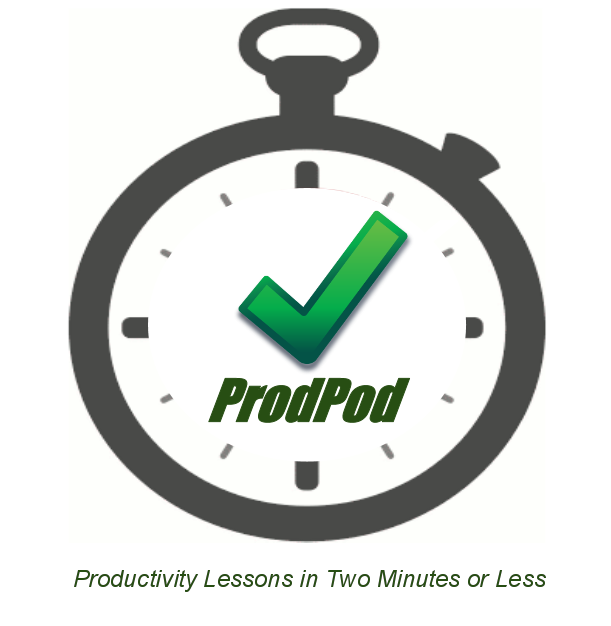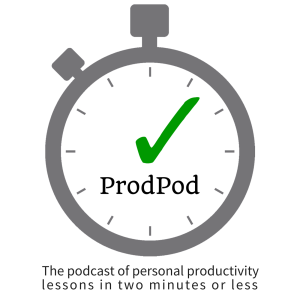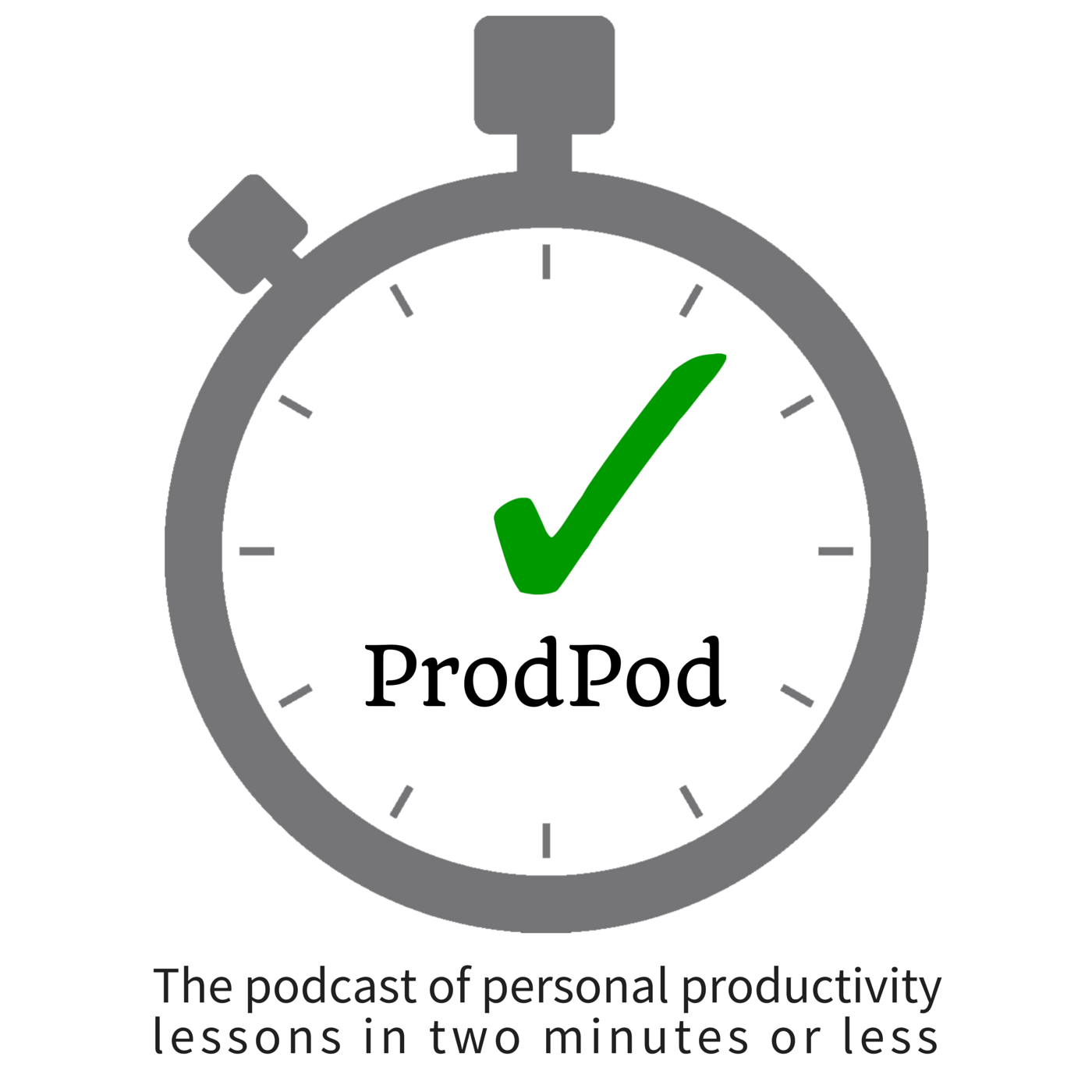Episodes

Thursday Apr 25, 2013
ProdPod: Episode 63 -- Life-Work Balance
Thursday Apr 25, 2013
Thursday Apr 25, 2013
In this episode, I explain my "calculation" of what I call life-work balance (because I work to live) and therefore life proceeds work, but perhaps not in the way you think. Note: I'll add this one final thought credited to my fellow productivity enthusiast and journalism professor Kenna Griffin (who you can find blogging at profkrg.com) who coined life-work balance instead as "Work-Life Negotiation" since all of life is a negotiation.
I hear people tell me often that I "work too much." While this may seem like the case, I can assure you that's not the case. I have a different paradigm about the definition of "work" and how it fits into my life. Life is dynamic and long-term process. Instead of worrying about if you're working too much (and definitely worrying about whether someone else is working too much), I suggest that you determine how satisfied you are with how you spend your time. And, you know what I'm going to say...there's only one way to know that...track your time! In this episode, I'd like to explain my calculation of what I call life-work balance (because I work to live, not vice versa) and therefore "life" should proceed "work," but perhaps not in the way you think.
Typically, it shouldn't take you more than a week or two of tracking your time on, say, an hourly basis. There are myriad applications that you can use, as well as a good old-fashioned printed spreadsheet with date, description of the task, and length of time spent on that task. At the end of this period of tracking, you'll have a pretty good sampling of your activities across work and life. Now, categorize them into your life categories. You can use a series of colored highlighters or just noting the category next to each task for which you tracked time. Are you starting to see any patterns?
Now, think about your life and life categories. In an ideal world,
Think of your life-work balance as a pie chart. All that matters is that the pie is whole and that you have a healthy perspective about its slices. That's balance...not a 50-50 balancing scale between all that is life and all that is work. Will your pie always be full? No. Will your pie sometimes burn? Yes. That's life and nothing a little elbow grease can't fix. But you know what your life-work balance pie should look like, and that'll help create better focus for you on how your pie should look, smell and taste.
I'll add this one final thought credited to my fellow productivity enthusiast and journalism professor Kenna Griffith (who you can find blogging at profkrg.com) who coined life-work balance instead as "Work-Life Negotiation" since all of life is a negotiation. Semantics makes a difference, so give that some thought. Thanks, Kenna!

Tuesday Apr 23, 2013
ProdPod: Episode 62 -- Best-Practices for Blog Reading
Tuesday Apr 23, 2013
Tuesday Apr 23, 2013
The blogosphere is not a new invention, although it was only recently embraced by media and the general consumer public in the late 90s. What does this mean for you and me? Well, it is likely a cornucopia of potentially amazing (and maybe not-so-amazing) content for us. So that reading all this great blog content doesn't become unwieldy, overflowing and overwhelming in our lives, I've put together a series of best-practices (pardon the corporate-speak) to keep Blog Reading a practice of compound benefits to your productivity.
1. Let's start with what you should and shouldn't follow in terms of blogs and bloggers. Less than three major media outlets...the sometimes pump out hundreds of articles per day and it can quickly overwhelm; if they have best-of feeds that limit to just the most important. Monthly purge of articles from blogs which you haven't read *any* posts...this keeps your list manageable. You can only read so much, and you owe it to yourself to find the material that best suits your personal tastes and professional needs.
2. Use an RSS feed reader, like Feedly, to combine all your blog reading into one centralized repository. I have keep two different accounts: one for personal and one for professional reading. You likely don't need that separation, but I need to so I don't get enticed into reading about cognitive neuroscience, personal productivity and electronics gadgets at the office when I should really be reading professional industry blogs!
3. Process this RSS feed reader inbox into Pocket, Instapaper, Readability or another reader app for offline reading if you can't read all the articles in your RSS feed reader in one sitting and you know you'll have time away from your computer or laptop, where you can bang through those articles that same day.
3. Once you set up your RSS feed reader, make the determination whether you will have a master feed from which to process incoming posts, or whether you'll use folders to segment groups of blog feeds together based on category or context. I have days when one or the other method is best suited for me, and I like being able to use different folders for context (@airport, @subway, @brain-dead, etc.) while at times just looking at All Items view and just processing from the master spigot of articles. You decide which best works for you.
4. Every morning, midday or evening before whenever you look at your RSS feed reader again, make sure to clear out your items in your reader app. This way, you don't start to compound reading material that you just aren't going to get to. One trick is to make sure to categorize by tagging every item you receive in your RSS feed reader (either automatically if it's available in your application, or manually as you select the important articles you want to read or reference later, as opposed to something you'd *like* to read for fun but isn't important enough to tag or track), as well as those you add to your reader app. That way, if you just swiftly archive everything you haven't read any given morning you can always retrieve the important reference materials from the category tags in the future quickly and easily. Don't depend on the built-in search functionality of your RSS feed reader or reader app to do the job only your brain can do of cataloging items you believe are important.
So there you have it, a set of techniques for making blog reading a well-greased productivity engine!

Thursday Mar 28, 2013
ProdPod: Episode 61 — Personal Life Action Negotiation (PLAN), Part Two
Thursday Mar 28, 2013
Thursday Mar 28, 2013
In episode 60, I presented an introduction to a personal development plan, but for your personal life, called the Personal Life Action Negotiation (with the acronym, PLAN). In this episode, I'll cover three guidelines for an effective PLAN.

Wednesday Mar 27, 2013
ProdPod: Episode 60 -- Personal Life Action Negotiation (PLAN), Part One
Wednesday Mar 27, 2013
Wednesday Mar 27, 2013
I'm developing a personal life planning tool called the Personal Life Action Negotiation (with the appropriate acronym, PLAN). In this episode, I explain the reasoning and overview. In episode 61, I give the general guidelines for creating a PLAN that works for you. Enjoy!

Tuesday Mar 19, 2013
ProdPod: Episode 59 -- Habit
Tuesday Mar 19, 2013
Tuesday Mar 19, 2013
I came across this poem (who's author is unknown to me) several years ago and I think it's definitely worth sharing. If you haven't yet listened to Episodes 12 to 15 on habit development, go check those out after listening to this episode. Enjoy!
Habit
I will push you onward or drag you down to
failure.
I am completely at your command.
over to me and I will do them - quickly and
correctly.
Show me exactly how you want something done
and after a few lessons, I will do it automatically.
and alas, of all failures as well.
Those who are great, I have made great.
Those who are failures, I have made failures.
I work with the precision of a machine
plus the intelligence of a person.
it makes no difference to me.
I will place the world at your feet.
I am your constant companion.
I am your greatest helper or heaviest burden.
Half of the things you do you might as well turn
I am easily managed - you must be firm with me.
I am the servant of great people,
I am not a machine though
You may run me for profit or run me for ruin -
Take me, train me, be firm with me, and
Be easy with me and I will destroy you.
Who am I? I am Habit.

